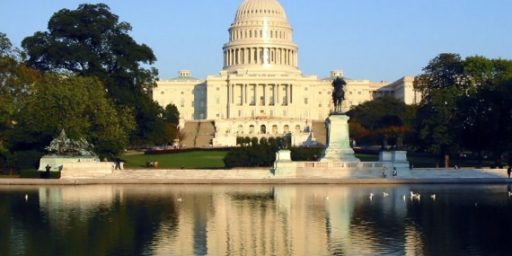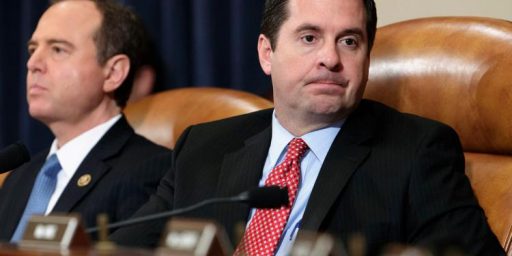Kavanaugh’s Bizarre Rationale
Things that make you go Hmmm.

from PxHere
POLITICO’s report “Supreme Court allows eviction ban to remain in place” left me puzzled.
The Supreme Court on Tuesday ruled to keep the federal eviction moratorium to in place, in a 5-4 decision in which Chief Justice John Roberts and Justice Brett Kavanaugh joined with liberals.
[…]
Kavanaugh wrote in Tuesday’s decision that he agreed with the lower-court ruling that the CDC had exceeded its authority but that its pending expiration swayed his thinking.
“Because the CDC plans to end the moratorium in only a few weeks, on July 31, and because those few weeks will allow for additional and more orderly distribution of the congressionally appropriated rental assistance funds, I vote at this time to deny the application to vacate the District Court’s stay of its order,” he wrote.
There’s more to the report but it doesn’t explain away the puzzling thing: Kavanaugh’s refusal to stop the CDC from continuing to exceed its authority on account of it promises to stop doing so in another month. What kind of judging is that?
None of the other sources I consulted (NYT, WaPo, NPR, AP, SCOTUSBlog) explain this discrepancy, either, so I went to the opinion itself. It’s exceedingly short.
I agree with the District Court and the applicants that the Centers for Disease Control and Prevention exceeded
its existing statutory authority by issuing a nationwide eviction moratorium. See Utility Air Regulatory Group v.
EPA, 573 U. S. 302, 324 (2014). Because the CDC plans to end the moratorium in only a few weeks, on July 31, and
because those few weeks will allow for additional and more orderly distribution of the congressionally appropriated
rental assistance funds, I vote at this time to deny the application to vacate the District Court’s stay of its order. See
Barnes v. E-Systems, Inc. Group Hospital Medical & Surgical Ins. Plan, 501 U. S. 1301, 1305 (1991) (Scalia, J., in
chambers) (stay depends in part on balance of equities); Coleman v. Paccar Inc., 424 U. S. 1301, 1304 (1976)
(Rehnquist, J., in chambers). In my view, clear and specific congressional authorization (via new legislation) would be
necessary for the CDC to extend the moratorium past July 31.
While I think the Alabama Association of Realtors and their clients have the better case on the merits, I get that getting emergency injunctive relief is a high barrier. And I generally applaud judges acknowledging administrative realities like the need for time to distribute funds.
In this case, though, a majority of the justices–the four dissenters plus Kavanaugh—believe the CDC is acting illegally and has been acting illegally for more than a year now. How, then, can that be allowed to stand on the basis that, well, it’s almost over?






Sure, if you look at Kavanaugh’s purported philosophy, this makes no sense. On the other hand, according to what appears to be his actual philosophy, this makes perfect sense. If the Republicans on the Supreme court rule against the CDC, then when hundreds of thousands of poor families are tossed out onto the street the Republicans will get the blame. If the ruling simply expires, the blame will not ricochet onto the Republicans.
Kavanaugh’s rulings can usually be predicted by this method, or at lest understood in retrospect.
Injunctive relief really isn’t a decision about the legal merits of an issue so much as one of process. If the case had actually come before the court, it would have been overturned. This is more of a process question – is there cause for us to intervene in the process?
He gave you the answer in his reasoning – balance of equities. On face, the chaos of ending it early & effects that would have on society as a whole outweighs the minimal benefit the landlords would obtain (and shortly will obtain anyway by default).
To be entirely cynical, SCOTUS Justice is a terrific gig so long as the US is a largely functioning democracy. As a failing state descending into chaos, not so much. CJ Roberts is well aware of that and I believe it shapes his thinking. Of the conservative wing, the three Justices aged 49-56, who have a lot of years ahead of them, can be convinced by the CJ from time to time (so, don’t yank health insurance away from 20 million people; don’t kick millions of households out of their homes abruptly). The two old conservatives at 70+ are not so concerned.
IANAL but if the ban expires in a month, there would seem to be little cause for emergency relief. They told the CDC don’t do it again. Justice would seem to be served, if not punctilio.
Adding to what @HarvardLaw92 said, it also is pretty clear that extending the moratorium would not be upheld.
That said, on the merits, without reading the opinions, or much about them, I’m worried that it is creating a precedent where the CDC cannot act in an emergency.
@HarvardLaw92: What you say makes sense, but why wouldn’t that apply to the other four Republicans. It’s useful to remember that Kavanaugh was for years an explicitly political operative, taking partisan positions at the center of some of the most controversial political disputes of the day. He was deep into both the Clinton / Lewinsky scandal and the Stop-the-Count effort in Florida. During those times he laid out legal justifications that he has subsequently made clear are based on partisanship and will not be applied when it would not benefit his party.
@MarkedMan:
Basically it does, but once there are five votes to deny the petition, more of them don’t add anything substantive. In practical terms, 9-0 isn’t any more of a “NO” than 5-4 is. That leaves the other four free to gripe about how it’s wrong without actually having to do anything about it from the safety of the stay remaining intact. Old men shout at clouds…
@Gustopher:
Once the moratorium ends, the underlying cases challenging the CDC will pretty certainly (IMO) be dismissed due to mootness. It’ll leave the status quo intact until the next time. Not 100% certain, but likely I think.
@HarvardLaw92:
Well, unless Congress acts to… Nevermind, carry on.
@Kurtz:
Egg yack lee… 🙂
In addition to HarvardLaw92‘s observations about injunctive relief, I infer the immediate question was whether even to hear the application, which makes this a procedural question about a procedural question. I imagine justices often leave in place appellate decisions they disagree with because the Court has finite resources and is not there to fix every little problem. Accepting the application is itself discretionary and Kavanaugh is simply explaining the basis of his discretionary decision not to accept the application.
@Michael Cain: “To be entirely cynical, SCOTUS Justice is a terrific gig so long as the US is a largely functioning democracy. As a failing state descending into chaos, not so much. ”
More like descending into a one-party state with most chaos coming from partisan groups associated with that party.
That can be quite comfortable for elites who are almost 100% aligned with that party’s goals.
And this has been the goal of the Federalist Society sone it was founded.
You thought they picked Kavanaugh because of his legal acumen/judicial temperament? That’s sooooo precious.
It was an equities/procedural question. Hence the “heck, it’s gonna expire soon enough anyway, let’s not rock the boat” decision.
Lots of non-lawyers fail to understand that there are law cases about issues, then there are law cases about the procedures involving an issue, and then there are law cases about the equities involving an issue.
Those are all different and you can get a judge who can give a “no” to a decision involving Issue A, a “yes” to a law case involving a procedure about a lawsuit involving Issue A, and a “yes” to a equities case involving Issue A.